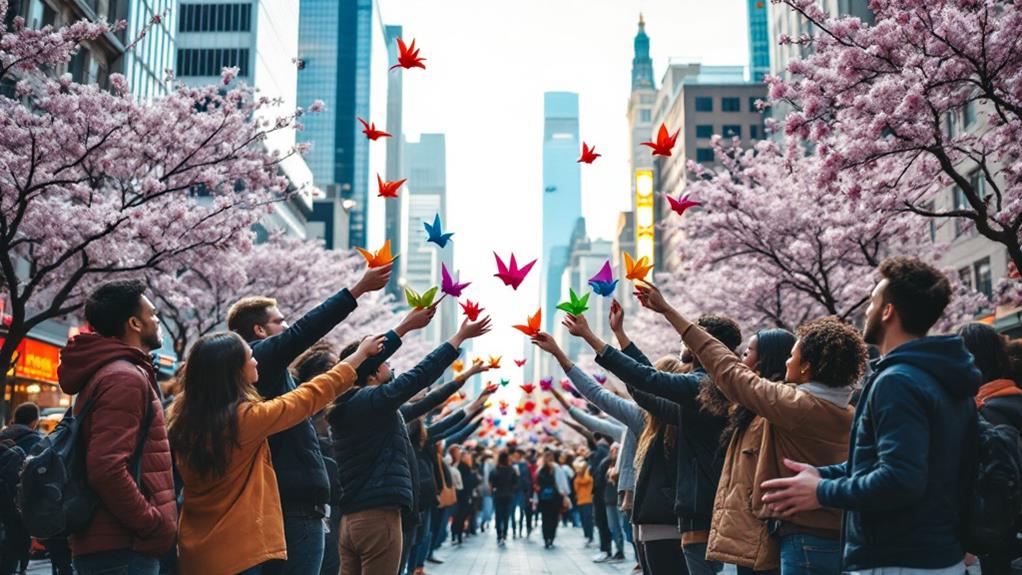Why Random Acts of Kindness Are So Important in Today’s World

Random acts of kindness are pivotal in today's world because they offer a simple yet powerful antidote to the increasing isolation, negativity, and stress many people face. These small, unexpected gestures can dramatically impact both the giver and recipient, elevating mood, improving physical health, and nurturing a sense of community. By engaging in acts of kindness, you're not only brightening someone else's day but also releasing feel-good chemicals in your own brain. This practice can serve as an effective coping mechanism during challenging times and help create a ripple effect of compassion in society. Uncover how incorporating kindness into your daily life can transform your world and those around you.
Understanding Random Acts of Kindness
Random acts of kindness have the power to alter someone's day in an instant. These small, unexpected gestures can make a big impact on others by sparking joy and happiness. When you perform a random act of kindness without any ulterior motive, you're sending a powerful message of care and importance to the recipient.
You don't need to go to great lengths to make a difference. Simple actions like asking about someone's day, offering a sincere compliment, or buying a coffee for a stranger can create a ripple effect of positivity. These acts not only enhance the recipient's mood but also increase your own sense of happiness and optimism.
Remember that kindness starts with yourself. Practice self-kindness by speaking to yourself with a gentle voice and acknowledging your positive qualities. This self-compassion will naturally extend to others, making random acts of kindness easier to perform.
Challenge yourself to carry out one random act of kindness each day. You'll be surprised by the positive feelings it generates, both for you and those around you. In today's fast-paced world, these small gestures can make a significant difference in cultivating a sense of community and belonging.
The Power of Small Gestures
Small gestures can have an outsized impact on people's lives. When you hold the door for someone, offer a genuine compliment, or simply smile at a stranger, you're engaging in acts that may seem insignificant but can profoundly affect others. These small gestures of kindness can make you feel good about yourself and brighten someone else's day simultaneously.
The power of these actions lies in their ability to create a ripple effect. When you show kindness, you're not only helping the recipient but also inspiring them to pay it forward. This chain reaction can cultivate a sense of community and connection among people who might otherwise feel isolated or overlooked.
Moreover, small gestures are accessible to everyone. You don't need money, special skills, or vast amounts of time to show kindness. A simple "thank you" to a service worker, letting someone merge into traffic, or offering your seat on public transport are all ways to make a positive difference. By incorporating these acts into your daily routine, you can contribute to a more compassionate and empathetic society, one small gesture at a time.
Benefits for Givers and Recipients

When you engage in random acts of kindness, you're not just benefiting others; you're also doing yourself a world of good. Every time you make a random act of kindness, your brain releases feel-good chemicals like oxytocin, serotonin, and dopamine. This chemical cocktail improves your mood, reduces stress, and enhances your overall well-being. Kindness is Good for your physical health too, lowering blood pressure, reducing inflammation, and potentially increasing your lifespan.
As a recipient, you'll experience an immediate surge in positive emotions when someone extends kindness to you. You'll feel less lonely and more connected to your community. The benefits don't stop there; even witnessing acts of kindness can activate the same reward centers in your brain as performing them.
Kindness as a Coping Mechanism
The power of kindness extends beyond its immediate benefits, serving as a precious coping mechanism during life's challenges. When you're facing stress, grief, or difficult emotions, performing acts of kindness can be a powerful tool for maintaining your mental health. By focusing on others, you're able to shift your attention away from your own problems and find a sense of purpose in helping those around us.
Research shows that kindness can be an effective way to combat symptoms of depression and anxiety. When you engage in acts of kindness, your brain releases feel-good hormones like oxytocin, serotonin, and dopamine, which can elevate your mood and overall well-being. This natural "high" can help you cope with stress and improve your mental state.
- Distraction from personal struggles
- Increased sense of purpose and self-worth
- Enhanced empathy and compassion for others
Fostering a Culture of Compassion

As we work to create a more compassionate world, nurturing a culture of kindness through random acts can have a deep impact on our communities. When you engage in or witness acts of kindness, you're not just brightening someone's day; you're contributing to a ripple effect that can transform society. Research shows that these actions inspire others to engage in similar prosocial behavior, creating an upward spiral of compassion.
By promoting a culture of kindness, you're helping to reduce stress and improve mental and physical health outcomes for yourself and those around you. Implementing kindness initiatives in schools, workplaces, and communities can normalize and incentivize these behaviors, leading to more empathetic and inclusive environments. As you spread kindness through small, spontaneous gestures, you're helping to build stronger social connections and a more supportive community.
Cultivating this sense of compassion isn't just about feeling good; it's about creating lasting change in the lives of those around you. By making kindness a priority, you're contributing to a society that values empathy, consideration, and mutual support.
Incorporating Kindness Into Daily Life
Incorporating kindness into your daily life doesn't require grand gestures or significant time commitments. Small acts of kindness can have a ripple effect, creating a more compassionate world. You can start by intentionally looking for opportunities to practice random acts of kindness throughout your day, such as holding the door open for someone or offering a genuine compliment to a stranger.
To make kindness a habit, consider incorporating these practices into your routine:
- Keep a kindness journal to reflect on your daily acts of compassion
- Set a daily kindness goal to motivate yourself
- Use technology to spread kindness through social media or virtual challenges
Remember that self-compassion is equally important. Cultivate self-kindness through positive self-talk and taking time for personal rejuvenation. By practicing self-compassion, you'll be better equipped to extend kindness to others.
Encourage your family, friends, and colleagues to join the kindness movement by leading by example. Share your experiences and inspire others to engage in Random Acts of Kindness. Together, we can create a culture of compassion that extends beyond our immediate circles and positively impacts the world around us.




